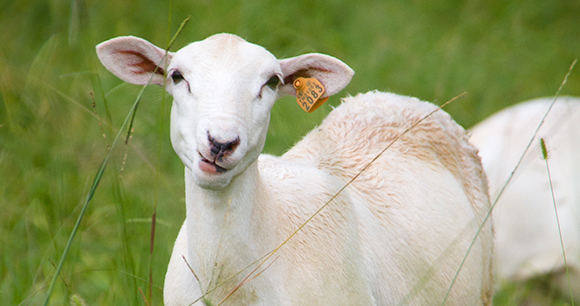
Eat Less or No Meat, Dairy, and Eggs
About 10 billion land animals are slaughtered for food in the United States each year. The average person in America consumes significantly more meat than is recommended. In fact, the average meat-eater will consume a total of 2,500 pigs, cows, chickens, turkeys, and sheep in their lifetime.
Less than 1 percent of farmed animals are raised on pasture, with space, fresh air, and sunshine and the chance to interact with others of their kind. It would be very difficult—if not impossible—to raise 10 billion animals under these conditions. To give all farmed animals a life worth living, Americans need to eat fewer of their products—that means less meat, dairy, and eggs.
Consuming fewer animal products isn’t just good for animals, it’s better for people too—reducing the risk of a number of chronic, preventable diseases, including cancer, cardiovascular disease, diabetes, and obesity. Eating fewer animal-based foods also benefits the planet by reducing environmental degradation from factory farms, saving precious land and water resources and reducing greenhouse gases associated with climate change.

Eating less meat doesn’t have to be daunting. Simply eating smaller servings and cutting out animal products from one meal per day, or for one day each week, can have a significant impact. To find out how to get started, visit meatlessmonday.com.
Make Better Food Choices: If Buying Animal Products, Look for Higher-Welfare Options
Most animal foods sold in supermarkets come from “factory farms,” where massive numbers of animals are confined to very small spaces. Conditions for the animals are usually nothing like the bucolic images used by corporate farming operations to advertise their products. Many of the country’s most popular meat and egg brands are produced from animals raised under the worst conditions.
You can avoid factory-farmed meat, dairy, and eggs by shopping at farmers markets or buying directly from small family farms. Ask the farmers how their animals are raised and whether you can visit the farm. If you shop at a supermarket, ask the manager to stock food from pasture-raised or free-range animals and products certified to meet higher animal welfare standards. Use customer comment cards and helplines to tell food retailers you care about the welfare of farmed animals. And beware of the claim “natural,” which has no relevance to how the animals were treated.
You can identify foods with the highest animal welfare standards by looking for these food certification logos on packages:
- Global Animal Partnership (Steps 4, 5, 5+)
- Certified Animal Welfare Approved by AGW
- Certified Grassfed by AGW
If certified products are not readily available, look for these claims:
- “pasture raised”
- “free range”
An easy way to locate higher-welfare products in your area is by visiting the Find Humane website or downloading the app. To learn more about common label claims found on meat, dairy, and eggs, check out AWI’s Food Label Guide.
Less common foods that should be avoided because they are produced from animals who have been raised or slaughtered in an especially inhumane manner include foie gras (fattened liver derived from force-feeding ducks or geese) and milk-fed veal (meat from very young, intensively confined calves).
Prevent the Growth of Factory Farms
The rearing of farmed animals today is dominated by industrialized operations known as concentrated animal feeding operations (CAFOs, or “factory farms”) that maximize profits by treating animals not as sentient creatures, but as production units. Raised by the thousands—sometimes millions—at a single location, animals in factory farms are confined in such tight quarters that they can barely move, let alone behave naturally.
Factory farms not only mistreat animals, they also pollute the environment and endanger the health and well-being of their workers and residents of the surrounding community, who are often underserved and economically disadvantaged. They consume large quantities of natural resources and lower community property values.
Local opposition is among the most effective ways to prevent the construction or expansion of animal factories. In fact, small groups of local advocates across the country have succeeded in keeping factory farms out of many communities. If you learn about a planned development in your area, here are a few things you can do to stop it:
- Contact organizations with expertise, like Socially Responsible Agriculture Project (SRAP)
- Learn everything you can about the approval process, including permitting and other regulatory requirements.
- Learn everything you can about the company and its plans for the facility.
- Join a local citizens’ action group or start your own, and seek legal advice.
- Organize a letter-writing campaign or circulate a petition.
- Meet with your local elected officials or decision-makers to voice your concerns.
Spread the Word—and More!
Other ways to help farmed animals:
- Become politically active by supporting state and federal legislation to protect farmed animals: Sign up for action alerts from AWI to receive the latest news on how you can help all animals.
- Share what you’ve learned with your friends, family, neighbors, and co-workers. Expand your audience by sharing via social media. Consider sharing our Consumers’ Guide to Animal Welfare.
- Consider volunteering at a farm animal sanctuary or adopting a rescued farm animal if you have the required resources.
- If you witness or learn about possible neglect or cruelty to a farm animal, report it to your local humane society, animal care agency, or law enforcement agency.
- Remember to take your values with you when you travel, and use platforms like HappyCow to find plant-based options.
- Finally, consider purchasing higher welfare pet food. Several companies now offer food and treats for dogs and cats that are made with certified ingredients. Plant-based pet foods might also be an option after consultation with a veterinarian to ensure your pet's nutritional needs are met.